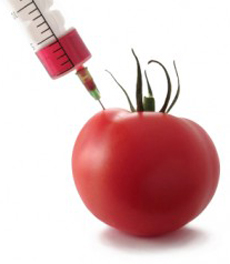FOOD HOLIDAY: Non-GMO Month
|
Tomatoes are genetically altered to improve |
What are GMOs, and why should you care?
GMOs, genetically modified organisms, are plant and animal organisms that have been created through gene-splicing, a biotechnology technique also known as genetic engineering (GE). This relatively new science allows DNA from one species to be injected into another species in a laboratory, creating combinations of plant or animal DNA that do not occur in nature or through traditional crossbreeding methods (fish genes have been spliced into tomatoes, for example). Successful experiments have been introduced commercially. Why do companies create GMOs? To create foods that better meet production goals. The goals can be anything from tomatoes that are resistant to rot to lambs that can grow larger and produce bigger lamb chops (more examples here). |
|
|
While not all varieties of any particular type of food are genetically engineered, here are the foods to question: Top 10 Genetically Engineered Food Crops See why these crops have been genetically engineered, and how likely you are to run across them. Note: while natural foods may label themselves “Non GMO,” there is no requirement for a genetically engineered food to label itself as such. Needless to say, many in the consumer and industrial communities are against genetic engineering. What’s The Issue? According to Discovery News, “For years, opponents have argued that genetically engineered plants wreak havoc with human health and nature, and accuse plant biotech companies, such as Monsanto, of putting profits before people. On the other hand, agricultural biotech proponents argue that engineered crops enable farmers to grow [more food] at a time of global food shortages, insidious pests, weeds and extreme weather.” It’s a complicated issue. While the FDA believes that GMOs are safe and allows them in America, some 30 other countries, including Australia, Japan and the entire European Union, restrict or outright ban the production of GMOs—because they are not considered to be proven safe. The FDA approved commercial production of GMOs based on studies conducted by the very companies that created them and profit from their sale. Many health-conscious shoppers find the lack of rigorous, independent, scientific examination on the impact of consuming GMO-based foods to be cause for concern. It will require many decades of eating engineered food before we know if GMOs cause problems in humans. While we at THE NIBBLE are unqualified to have an opinion on their safety, we do have an opinion on lobbyists and the power they exert over our elected and appointed officials to gain approval and pass legislation on behalf of their employers. So the next time you’re making a purchase decision, consider the package that says “non-GMO.” How Can You Avoid GMO Food? An organization called True Food Now offers a free mobile app for iPhone and Android. It is a guide to common genetically engineered ingredients, brands to look for (and look out for) and common sense tips. For more information about GMOs, visit The Non GMO Project.
|
||


